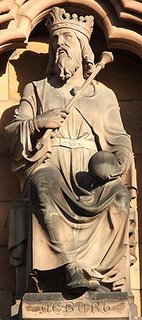Egbert of Wessex

Egbert, king of Wessex (802-39) who came to be known as Bretwalda, or king of the English (829-39), died on this day in 839 at the age of about 69.
Although Offa, king of Mercia (757-96), is often credited as the first of the regional overlords of England to be recognized as "king of the English," it is generally accepted that Egbert is the first king in the line of English royalty we know today, in part because his progeny have retained the throne, through his grandson Alfred the Great and his descendants Henry II, Henry VII, James I, George I, Victoria and, eventually, Elizabeth II.
The beginning of his career showed more swagger than promise: a son of the murdered king of Kent, Ealhmund, the 16-year old Egbert brashly put forth his name to the Wessex council of elders for the vacant throne of Wessex after the murder of Cynewulf in 786, but under Offa's influence, the Wessex seat went to a middle-aged rival, Beorhtic. Egbert shrewdly left Wessex for Offa's court, but Beorhtic grew concerned that Egbert might be a troublesome juvenile rabble-rouser; while negotiating with Offa over a proposed marriage to Offa's daughter, Beorhtic asked that Egbert be placed in his custody.
Seeing through Beorhtic's potentially deadly designs, Egbert fled England, and by 792 he had found refuge in the Frankish court of Charlemagne at Aachen. Tracing Charlemagne's steps as the Frankish king conquered new lands and grappled with administration and laws was an advanced tutorial on the art of kingship for Egbert, but his presence at court also secured for him an alliance-by-marriage with the Franks as he wed Redburga, one of Charlemagne's nieces.
Through subtle diplomacy, important reminders of his traceable lineage back to the first king of the West Saxons (the 6th century lord Cerdic), and occasional displays of authority on visits from the continent, Egbert kept in touch with the Wessex council of elders, and after the death of Offa in 796 and Beorhtic in 802, at the age of about 32 Egbert was recalled from Aachen and elected king of Wessex.
He spent the earliest years of his reign biding his time, cultivating support among strong nobles and bishops until 815, when he devastated the independent kingdom of Cornwall and brought it under his authority. In 825, he faced an invasion by Offa's successors in Mercia, but he beat them handily at Ellendun in Wiltshire. With his troops on the ready, he turned his heels and quickly marched on Kent (where he drove out the local king), and more or less bloodlessly (and permanently) conquered the entire southeast of England. He joined the kingdom of East Anglia in fighting against Mercia on its own turf in 829, and marched on to conquer Northumbria later that year.
With these regions (save East Anglia) in his grasp, Egbert succeeded in bringing most of England south of the Humber under his protectorate, giving him the status of Bretwalda -- "for one brief shining moment," as Lerner and Loewe would say, since Mercia managed to throw off Egbert's rule by 831. Nonetheless, Egbert continued to assert his status as Bretwalda. In his final years, he sent his son Ethelwulf to rule in Kent, and spent much of his time planning the tactics by which his vassals fought the pesky Danes who began to nibble at the edges of England around this time. He is said to have been buried at Winchester.
Labels: Anglo-Saxon England, Kings and Queens





0 Comments:
Post a Comment
Subscribe to Post Comments [Atom]
<< Home